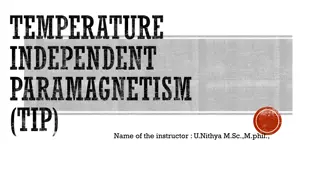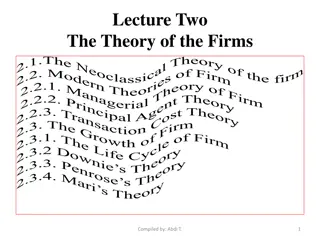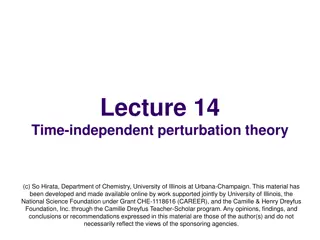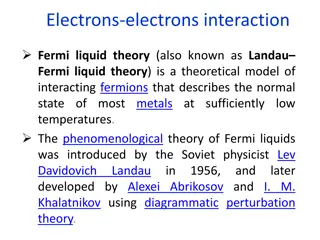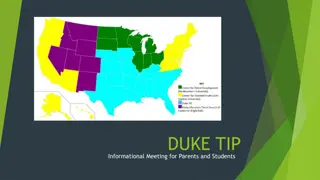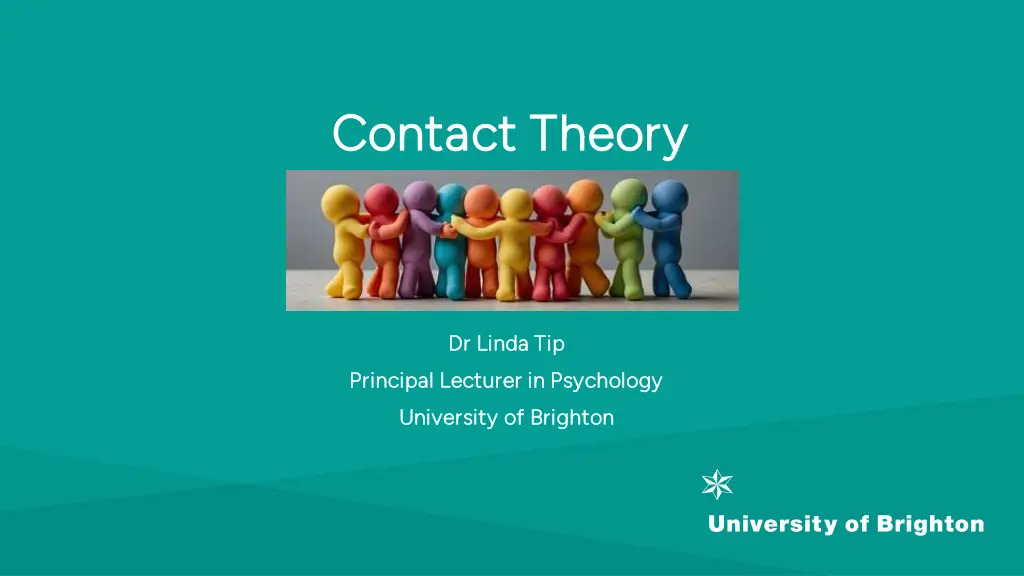
Diverse Perspectives on Contact Theory and Social Cohesion
Explore the impact of Contact Theory and Intergroup Contact on reducing prejudice, improving intergroup relations, and enhancing social cohesion. Understand the conditions needed for successful integration and the challenges faced in accessing education, language provision, employment, health, and housing. Real-life examples shed light on the dynamics of building relationships in a multicultural society.
Download Presentation

Please find below an Image/Link to download the presentation.
The content on the website is provided AS IS for your information and personal use only. It may not be sold, licensed, or shared on other websites without obtaining consent from the author. If you encounter any issues during the download, it is possible that the publisher has removed the file from their server.
You are allowed to download the files provided on this website for personal or commercial use, subject to the condition that they are used lawfully. All files are the property of their respective owners.
The content on the website is provided AS IS for your information and personal use only. It may not be sold, licensed, or shared on other websites without obtaining consent from the author.
E N D
Presentation Transcript
Contact Theory Contact Theory Dr Linda Tip Dr Linda Tip Principal Lecturer in Psychology Principal Lecturer in Psychology University of Brighton University of Brighton
Intergroup contact theory Intergroup contact theory Contact Contact between people from different groups can reduce prejudice and improve intergroup relations when the groups have equal status equal status; the groups have common goals common goals; there is intergroup cooperation intergroup cooperation; there is support from authorities from authorities. reduce prejudice (Allport, 1954)
Contact theory & social cohesion Contact theory & social cohesion Intergroup contact theory contributes to social cohesion through prejudice reduction; increasing empathy and trust; an emphasis on cooperation; reducing social divisions and barriers; increasing social integration
Do we have the right conditions? Do we have the right conditions? Gaps in access to education Importance of good English language provision Need for tailored approaches to employment Poor health creates a cycle of isolation Need for safe, secure, and stable housing (Collyer, Morrice, Tip, Brown, & Odermatt, 2018; Morrice et al., 2019; Morrice et al., 2021; Tip et al., 2019; Tip et al., 2020;)
Examples Examples Yeah, you know when we came here we were lonely, and now we start to have friends with English people. I can say English people are not easy to make friends with. I am never invited to English people house invited to English people house, and English people they don t say anything to you without knowing you, knowing you deeply. You know the culture here we can t talk to anybody we don t know, and English people are sometimes not properly friendly. If you don t know them we can t talk to them. You need to know somebody before talk to him need to know somebody before talk to him. I am never You I would like to be more involved in the local I would like to be more involved in the local community, coming more together community, coming more together. You know, here the way of British life is so difficult. Here, maybe not everyone is in their homes or doing their own things, but in our culture, people come together people come together. Yes, it s difficult, I would like to see more things like that. Our neighbours are not like our people. With our people, if you make friends with them, they come close to you. They come to our house, or they invite you. You can sit and talk through everything you want. But the British people just say Hi , short talk, and then go to people just say Hi , short talk, and then go to their houses and close the doors. their houses and close the doors. in our culture, British
What can be done? What can be done? Facilitate contact! And create the right conditions: Create equal status equal status through economic and social inclusion; Create common goals common goals by involving refugees and non-refugees in shared activities that foster cooperation; Create intergroup cooperation intergroup cooperation by reducing competition and creating opportunities for collaborative efforts; Demonstrate support from authorities support from authorities through positive messaging, supportive policies, legal protections, etc.
References References Allport, G. W. (1954). The Nature of Prejudice. Addison-Wesley. Pettigrew, T. F., & Tropp, L. R. (2006). A Meta-Analytic Test of Intergroup Contact Theory. Journal of Personality and Social Psychology, 90, 751-783. https://doi.org/10.1037/0022-3514.90.5.751 Collyer, M., Morrice, L., Tip, L.K., Brown, R., & Odermatt, E. (2018). A long-term commitment: integration of resettled refugees in the UK. https://www.sussex.ac.uk/webteam/gateway/file.php?name=integration-of- resettled-refugees-in-the-uk-final-report.pdf&site=320 Morrice, L., Tip, L. K., Brown, R., & Collyer, M. (2019). Resettled refugee youth and education: aspiration and reality. Journal of Youth Studies, 23(3), 388-405. https://doi.org/10.1080/13676261.2019.1612047 Morrice, L., Tip, L. K., Collyer, M., & Brown, R. (2021). You can t have a good integration when you don t have a good communication : English-language Learning Among Resettled Refugees in England. Journal of Refugee Studies, 34(1), 681-699. https://doi.org/10.1093/jrs/fez023 Tip, L. K., Brown, R., Morrice, L., Collyer, M., & Easterbrook, M. J. (2019). Improving Refugee Well-Being with better language skills and more intergroup contact. Social Psychological and Personality Science, 10(2), 144-151. https://doi.org/10.1177/1948550617752062 Tip, L. K., Brown, R., Morrice, L., Collyer, M., & Easterbrook, M. J. (2020). Believing is achieving: a longitudinal study of self-efficacy and positive affect in resettled refugees. Journal of Ethnic and Migration Studies, 46(15), 3174-3190. https://doi.org/10.1080/1369183x.2020.1737513



